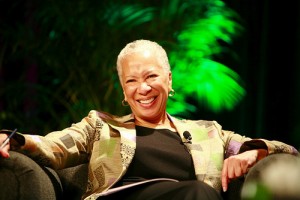This is a guest post by Angela Glover Blackwell, CEO of PolicyLink.
 Equity is a big, dynamic idea. The field — the universe of people working to create a just, fair society — is blossoming. Reading the provocatively titled blog post, “What the Heck Does Equity Mean?,” by Kris Putnam-Walkerly and Elizabeth Russell, I was struck by two thoughts. First, I am not surprised they found that a universal definition of equity is elusive. Second, I am not concerned.
Equity is a big, dynamic idea. The field — the universe of people working to create a just, fair society — is blossoming. Reading the provocatively titled blog post, “What the Heck Does Equity Mean?,” by Kris Putnam-Walkerly and Elizabeth Russell, I was struck by two thoughts. First, I am not surprised they found that a universal definition of equity is elusive. Second, I am not concerned.
Rather, I am thrilled to see so many people and organizations embrace the hope of equity and grapple with the complexity of translating that hope into action. I am grateful to see people in philanthropy and beyond search for their own ways to express equity and contribute to a broad-based effort to transform America into a nation in which all can participate, thrive, and succeed.
PolicyLink, the organization I lead, was founded nearly 20 years ago with a mission to advance economic and social equity, and for a long time we didn’t have a concise definition either. But we knew in our bones what equity meant and why it mattered. We saw equity as the antidote to structural racism and social and economic disparities across the nation. We were determined to advance policies to build a fair, inclusive America that delivers on the promise of opportunity for all.
Equity is different from the formal legal equality conferred by landmark laws such as the Civil Rights Act. Equality gives everyone the right to ride on the bus, in any seat they choose. Equity ensures there are bus lines where people need them so they can get to school or the doctor or work. It means policies and investments that grow good jobs and expand entrepreneurship opportunities for low-income people and people of color. It means policies that build human capabilities by upgrading the education and skill of the nation’s diverse workforce. It means policies that dismantle destructive barriers to economic inclusion and civic participation, and build healthy communities of opportunity for all.
PolicyLink went on to define equity this way: just and fair inclusion into a society in which all can participate, prosper, and reach their full potential. Some of our partners use our definition, many have articulated their own, and some are wrestling to find their own authentic expressions. Nevertheless, the aspiration for equity has galvanized communities, advocates, government leaders, organizers, scholars, business leaders and philanthropists to rethink priorities, refocus strategies, and forge new partnerships to create a more equitable nation. There is growing consensus that equity is a win for everyone, not a zero-sum game, and it is essential for prosperity as America bolts toward becoming a majority people of color. The quest for the perfect definition should not slow down this amazing momentum.
Last year, more than 3,000 passionate, committed leaders from around the country gathered in Los Angeles for the PolicyLink Equity Summit. Leading up to the summit, our fifth and largest so far, PolicyLink created the Equity Manifesto as a touchstone for people engaged in the work of equity, however they define the word. The statement is intentionally expansive and inclusive. We wrote it not to impose a definition or prescribe solutions but to ignite the imaginations of people everywhere about the possibilities in our changing nation and to lift up the values that can bring us together in charting the course toward a fair, inclusive, equitable future. PolicyLink created a short video that captures the spirit of the work.
I share both here.
It begins by joining together, believing in the potency of inclusion, and building from a common bond.
It embraces complexity as cause for collaboration, accepting that our fates are inextricable.
It recognizes local leaders as national leaders, nurturing the wisdom and creativity within every community as essential to solving the nation’s problems.
It demands honesty and forthrightness, calling out racism and oppression, both overt and systemic.
It strives for the power to realize our goals while summoning the grace to sustain them.
It requires that we understand the past, without being trapped in it; embrace the present, without being constrained by it; and look to the future, guided by the hopes and courage of those who have fought before and beside us.
This is equity: just and fair inclusion into a society in which all can participate, prosper, and reach their full potential. Unlocking the promise of the nation by unleashing the promise in us all.






